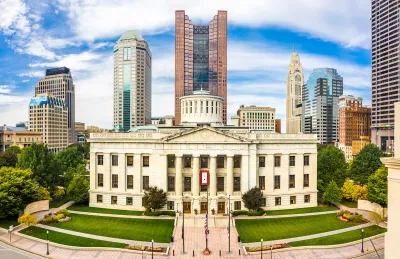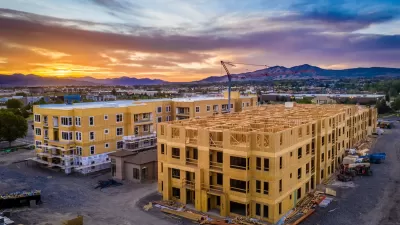The Senate-approved budget also creates two new programs aimed at encouraging housing construction.

A two-year budget approved by the Ohio State Senate restores the state’s Housing Trust Fund, a key source of support for affordable housing and emergency housing programs, and funds two new housing programs.
As Megan Henry explains in the Ohio Capital Journal, “The Housing Trust Fund is funded by a portion of the fees collected by county recorders, with half of the fees staying with the county and the other half going back to the fund — which requires at least 50% of the funds be spent in non-urban areas.” The House’s version of the budget would have eliminated the reallocation requirement, potentially reducing resources in parts of Ohio that need it most.
“The Senate added $100 million worth of housing provisions in the budget that will create two programs — the Residential Economic Development District grants and Residential Development Revolving Loan Program.” The first is aimed at encouraging cities to rezone areas to encourage more housing production. The revolving loan program would support new single-family residential housing in rural areas.
The budget goes back to the House and Senate, who must pass a bill they agree on before it goes to Governor Mike DeWine for his signature.
FULL STORY: Ohio Senate added $100 million worth of housing provisions in the state’s two-year budget

Planetizen Federal Action Tracker
A weekly monitor of how Trump’s orders and actions are impacting planners and planning in America.

Congressman Proposes Bill to Rename DC Metro “Trump Train”
The Make Autorail Great Again Act would withhold federal funding to the system until the Washington Metropolitan Area Transit Authority (WMATA), rebrands as the Washington Metropolitan Authority for Greater Access (WMAGA).

The Simple Legislative Tool Transforming Vacant Downtowns
In California, Michigan and Georgia, an easy win is bringing dollars — and delight — back to city centers.

Albuquerque’s Microtransit: A Planner’s Answer to Food Access Gaps
New microtransit vans in Albuquerque aim to close food access gaps by linking low-income areas to grocery stores, cutting travel times by 30 percent and offering planners a scalable model for equity-focused transit.

This City Will Pay You to Meet Your Neighbors
A North Kansas City grant program offers up to $400 for residents to throw neighborhood block parties.

Commentary: Our Silence Will Not Protect Us
Keeping our heads down and our language inoffensive is not the right response to the times we’re in. Solidarity and courage is.
Urban Design for Planners 1: Software Tools
This six-course series explores essential urban design concepts using open source software and equips planners with the tools they need to participate fully in the urban design process.
Planning for Universal Design
Learn the tools for implementing Universal Design in planning regulations.
Smith Gee Studio
City of Charlotte
City of Camden Redevelopment Agency
City of Astoria
Transportation Research & Education Center (TREC) at Portland State University
US High Speed Rail Association
City of Camden Redevelopment Agency
Municipality of Princeton (NJ)





























